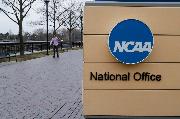
NCAA votes to accept $2.8 billion settlement that could usher in dramatic change for college sports
The NCAA and Southeastern Conference leadership have approved a $2.8 billion settlement of antitrust claims, moving college athletics closer to some of the most sweeping changes in its history.
The SEC became the latest league to agree to the proposal when its presidents and chancellors voted unanimously in favor on Thursday, a person with direct knowledge of the decision told The Associated Press on condition of anonymity because the conference was not making its internal discussions public.
With four of the five power conferences on board, only approval from the Pac-12 was needed to move forward with the proposed settlement. A decision from its presidential board was expected later Thursday.
The proposal could resolve three major antitrust lawsuits against the NCAA that carry the threat of billions in damages, a blow that would cripple the organization founded in 1906 that oversees some 500,000 athletes in dozens of sports.
If approved by a judge, it would further upend the NCAA’s longstanding amateur sports model by allowing revenue-sharing by schools with their athletes, who were allowed to begin earning endorsement money less than three years ago.
The NCAA completed its approval process late Wednesday, with its 15-member Board of Governors voting unanimously to accept the plan — with one member abstaining — according to two people with direct knowledge of the vote who spoke to The Associated Press on condition of anonymity because the NCAA was not publicly revealing its internal process.
Attorneys for the plaintiffs in House v. the NCAA had set a Thursday deadline for agreement on a settlement. The Big 12 and Atlantic Coast Conference have already signed off Tuesday and Big Ten presidents joined them Wednesday, a person with direct knowledge of the decision told AP.
Under terms of the proposed settlement, the NCAA would pay $2.77 billion over 10 years to former and current college athletes who were denied by now-defunct rules the ability to earn money from endorsement and sponsorship deals dating to 2016. The NCAA and conferences also would agree to establish a revenue-sharing system, with schools allowed — though not required — to spend about $21 million each year on their athletes. That number could grow over time if revenue increases.
As the leagues and NCAA marched toward the settlement, a fourth antitrust case presents a potential complication.
U.S. District Judge Charlotte Sweeney in Colorado ruled Thursday that Fontenot vs. the NCAA will stay in her court instead of being moved to California and combined with one of the other antitrust lawsuits that could be covered by the settlement.
Attorney for the plaintiffs in Fontenot said they won’t know whether their claims would be covered by the settlement until they have all the details of the proposal.
“One way or the other, they have to deal with us or I just don’t see how a settlement ultimately gets done,” George Zelcs, one of the plaintiffs' attorneys, told AP. “They have to either include us or get an order that requires us to be involved in it. All of which we have arguments against as well.”
The NCAA and five conferences named in the House vs. NCAA lawsuit that is at the center of settlement talks asked Sweeney to combine the Fontenot case with Carter vs. the NCAA, which is being heard in the Northern District of California.
House and Hubbard v. NCAA have already been combined in the Northern District of California and are being overseen by U.S. Judge Claudia Wilken, who has ruled against the NCAA in several high-profile antitrust cases in recent years. Carter is being overseen by U.S. Judge Richard Seeborg. Fontenot would be added to Seeborg's cases.
Former Colorado football player Alex Fontenot filed his lawsuit last November, claiming NCAA rules have illegally prevented college athletes from earning their fair share of the millions of dollars in revenue schools bring in. Garrett Broshuis, Zelcs' colleague at the law firm Korein Tillery, said the Fontenot case should not be combined with the other three.
“House was focused on name, image and likeness issues, which is really just a small segment of the overall revenue that the NCAA and the conferences and their members are bringing in,” Broshuis told AP. “Our case is instead focusing on what would be the true free-market value of the services being provided by these athletes.”
Broshuis said the Carter case focuses on just basketball and football players from Power Five conferences — ACC, Big Ten, Big 12, Pac-12 and SEC.
“Whereas the Fontenot proposed class is broader than that. Revenue is revenue no matter what sport,” he said.
Steve Berman, one of the lead attorneys in House, said in a statement to AP the issues in Fontenot completely overlap with the other cases and the settlement — if approved — “will release all of their claims.”
“And as for their claim they are waiting to see if they want to be part of it, they already laid out objections to the court in Colorado without even seeing the agreement, a completely irresponsible thing to do,” Berman said. “Even more so when they haven’t contributed to the momentum that allowed us to accomplish this as opposed to being Johnny come lately.”
___
Follow Ralph D. Russo at https://twitter.com/ralphDrussoAP and listen at http://www.appodcasts.com
___
AP college football: https://apnews.com/hub/college-football
© Copyright The Associated Press. All rights reserved. The information contained in this news report may not be published, broadcast or otherwise distributed without the prior written authority of The Associated Press.

